The appraisal report is a crucial component of employee performance management.
Appraisals allow managers to gain deep insights into successes and failures while keeping goals aligned with the company’s mission statement.
In this guide to appraisals at work, we’ll discuss:
- The events that can trigger a staff appraisal
- The importance of conducting appraisals for performance
- How appraisals work and the key topics for discussion
- The limitations of appraisals – and how to overcome them
- The best practices to adopt to get the most from the appraisal process
What events can trigger a staff appraisal?
Staff appraisals are an important aspect of a successful company’s performance management strategy. An appraisal report helps managers and HR leaders understand the dynamics affecting employee performance in a high level of detail.
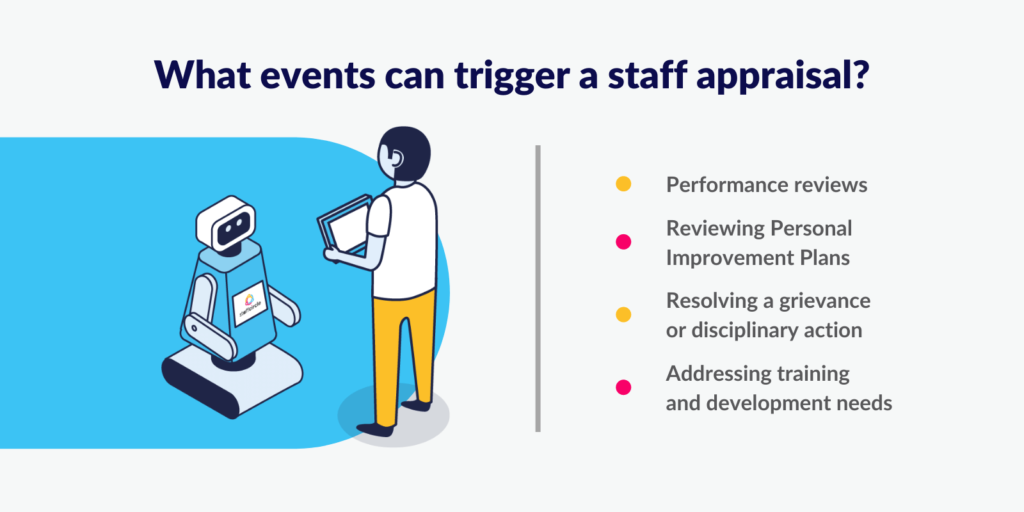
There are several events that can trigger a staff appraisal. Some of the key events include:
Performance reviews
The most common reason to use staff appraisals is as a part of their annual performance review. Some companies conduct these reviews on a quarterly or monthly basis to avoid a range of biases associated with annual reviews (we’ll discuss this in more detail later on).
Reviewing Personal Improvement Plans
Appraisals can sometimes be used when individual employee performance is being addressed with a Personal Improvement Plan (PIP). This may happen if the employee is especially struggling to hit their development goals and needs more in-depth and focused feedback to get them back on track.
Resolving a grievance or disciplinary action
An employee who has been placed on disciplinary measures may face an appraisal when the disciplinary action is due for review. This appraisal will be tailored to investigate whether or not the actions and attitudes which led to the disciplinary action have been addressed by the employee.
Addressing training and development needs
Some career development programs are tied directly to an appraisal process. In these cases, appraisals will be oriented towards reviewing progress, assessing achievements and challenges, and establishing new performance objectives.
Are appraisals important?
An in-depth study from the Global Journal of Human Resources Management, Assessment of the Effectiveness of Performance Appraisal on Work Productivity, outlines the core benefits of the performance appraisal:
“Performance Appraisal helps to improve upon the performance of staff which also goes to improve upon the overall performance of the organisation. Performance appraisal can also develop a greater degree of consistency through regular feedback on performance. It helps to reveal problem areas which restrict progress and cause inefficiency. It can also identify an individual’s strength and areas of development and indicate how such strengths may be utilized and weaknesses worked upon.”
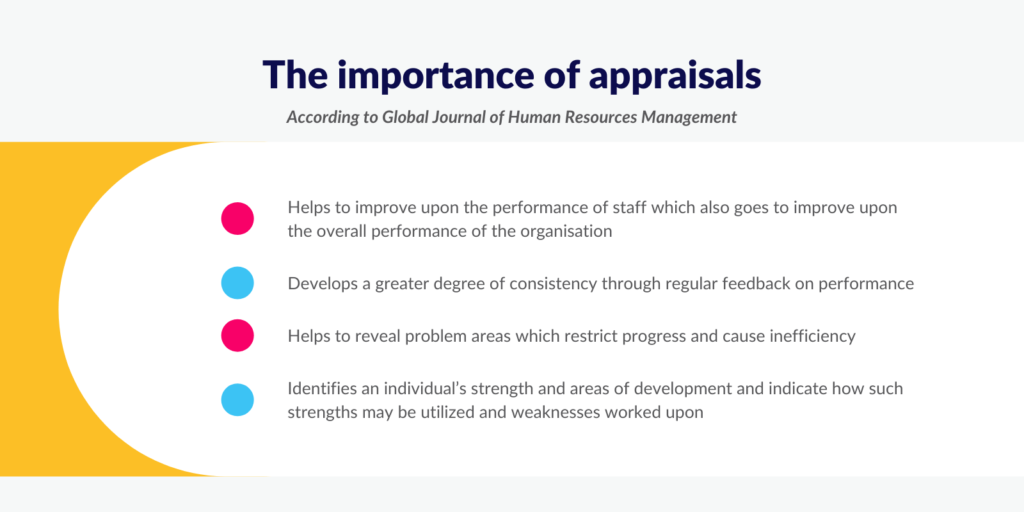
Additional reasons why it’s important to conduct appraisals include:
- Providing an opportunity to review current goals and set new ones
- Realigning employees with the company’s mission statement, making values accurate and relevant
- Letting your employees know they are valued, and giving sincere feedback to boost engagement and increase motivation
- Strengthening bonds between team members and improving performance management at the group level
- Giving an overview of the state of current projects and reflecting on the overarching direction both individuals and teams are heading
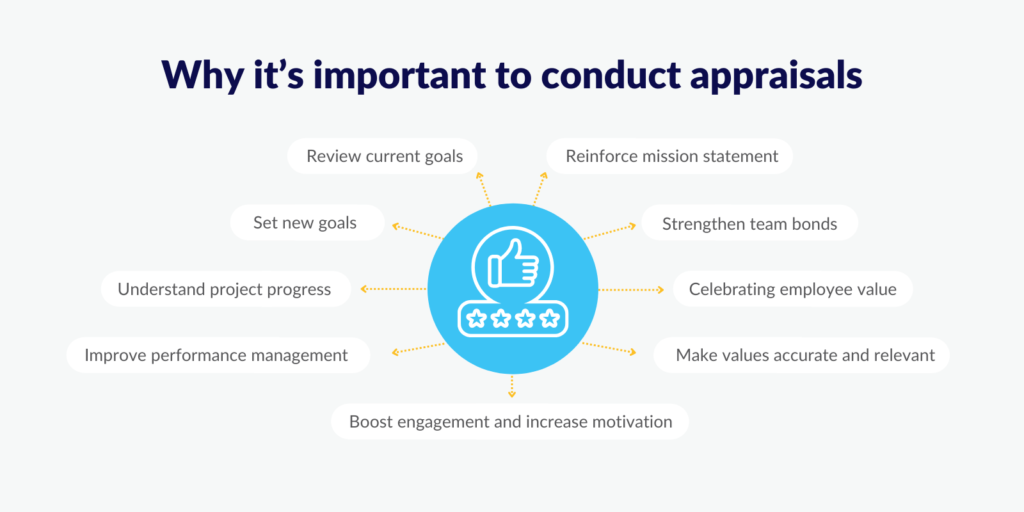
How it works
The performance appraisal process is relatively straightforward, with the basic structure of an appraisal report similar for most applications.
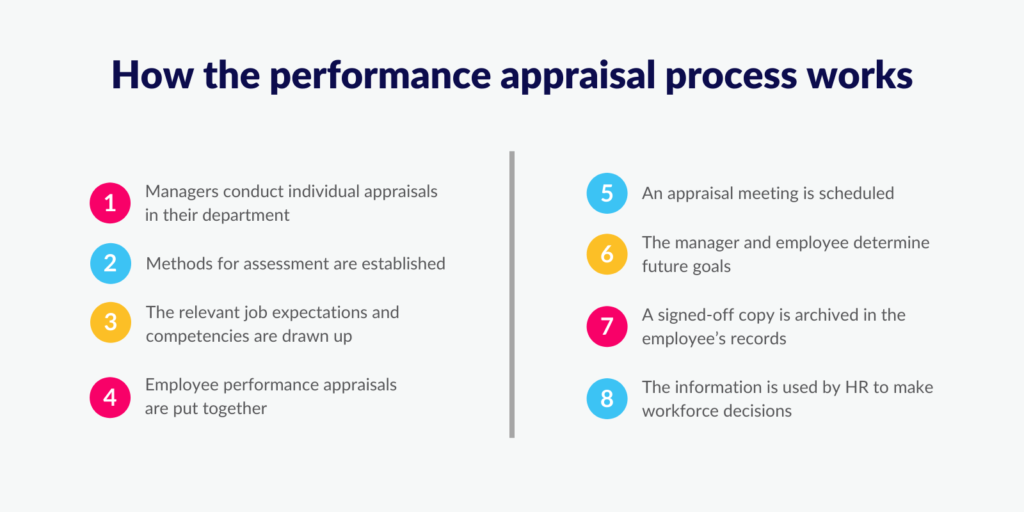
This process involves:
- Managers and supervisors liaise with the HR department to conduct individual appraisals in their department
- Methods for assessment are established, including the gathering of appropriate data and metrics to measure employee performance
- The relevant job expectations and competencies are also drawn up for each employee
- Based on these considerations, employee performance appraisals are put together. If necessary, this includes gathering additional information from the employee’s colleagues, line managers, team leaders, and clients through customisable 360-degree appraisals
- Once the appraisal report has been compiled, an appraisal meeting is scheduled. This is typically a one-on-one between the manager and the employee
- Once the details of the appraisal have been discussed in full, the manager and employee determine future goals
- A signed-off copy of the performance appraisal is archived in the employee’s records
- The information collected through the appraisal process is used by HR to help determine promotions, bonuses, succession planning, and other relevant decisions
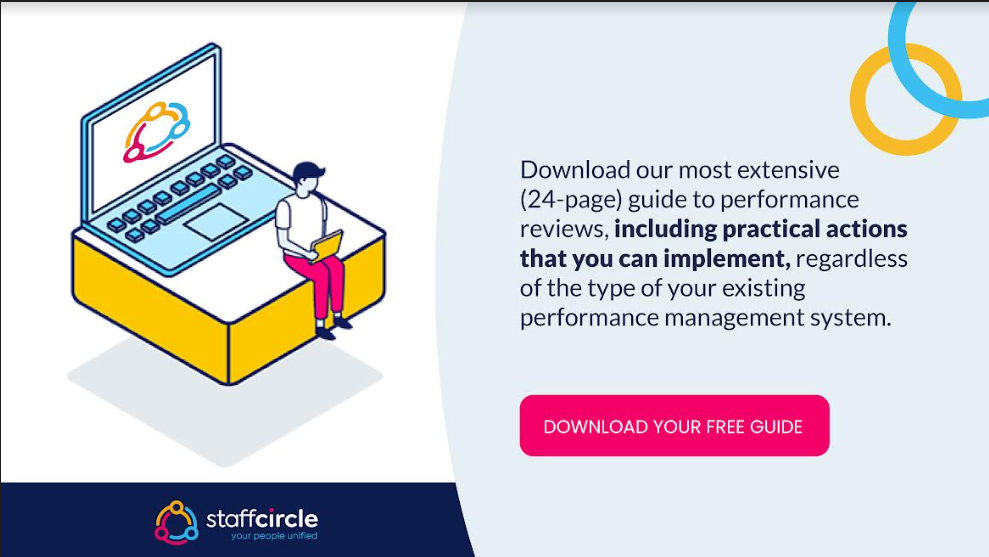
What is discussed in a work appraisal?
When setting up an appraisal meeting, it’s important to make sure the conversation focuses on what matters the most. As well as addressing the issues at hand, an appraisal meeting can help managers strengthen relationships and check in on their mental health and well-being, creating a deeper sense of trust.
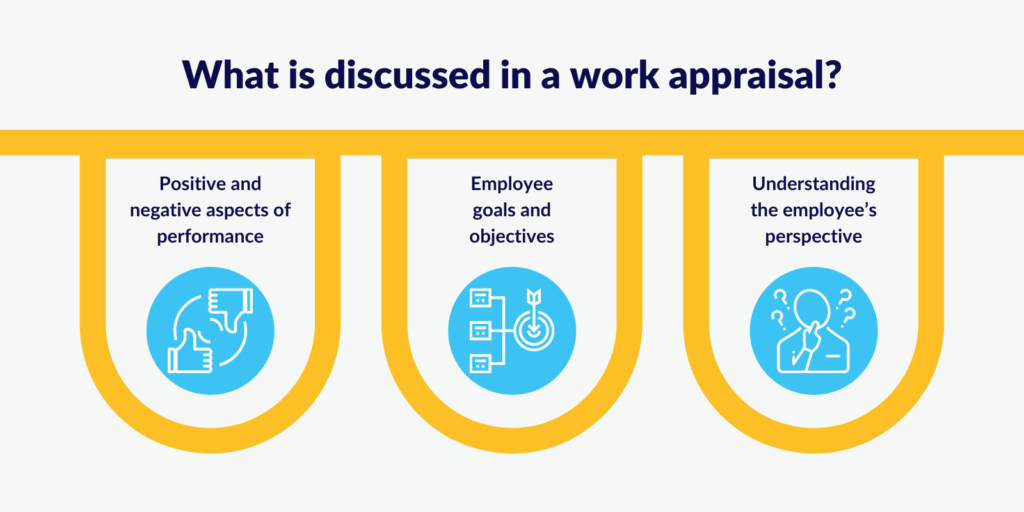
Other topics typically discussed in a work appraisal include:
- Positive and negative aspects of performance. A good appraisal should be a comprehensive discussion of all aspects of performance, ranging from commending the employee for great work, to offering constructive feedback for any performance shortcomings.
- Employee goals. As well as reviewing previous goals, appraisals are an opportunity to establish new OKR objectives based on the feedback to make sure the employee is clear on where they are heading. This will also involve referring back once again to both the employee’s job description, as well as the company’s mission statement, to reaffirm these goals are aligned.
- Gaining a clearer understanding of the employee’s perspective. A great appraisal isn’t a one-way conversation; it requires managers to take a step back and give the employee the opportunity to respond. Performance evaluations can sometimes miss important context. Employees can use the appraisal meeting to fill any gaps managers may have overlooked.
The limitations of appraisals
While appraisals can offer an in-depth overview of employee performance and are a fundamental component of the performance management process, there are some limitations associated with them.
Appraisals can be subject to a variety of cognitive biases which can limit their usefulness, so it’s important to be mindful of these before setting out. The halo effect can limit managers to focusing only on positive qualities. Failing to consider negative traits gives an incomplete picture of employee performance. Likewise, the horn effect, which is another common hurdle to giving reliable feedback, can lead to an over-emphasis on negative traits.
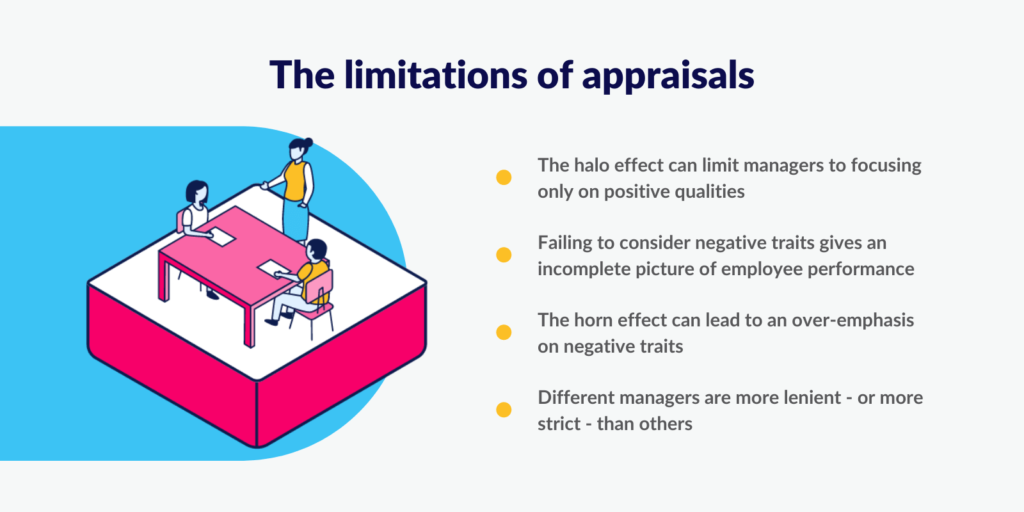
Different managers are more lenient – or more strict – than others, meaning some employees may lose opportunities they should have been granted due to manager bias. On the other hand, employees who are underperforming might avoid necessary constructive feedback because they have a good relationship with their manager, who doesn’t want to jeopardise this with his or her subordinate.
Do’s and Don’ts: 5 appraisal meeting best practices
There are best practices worth considering when approaching performance appraisals to make sure the process is as fair and thorough as possible.
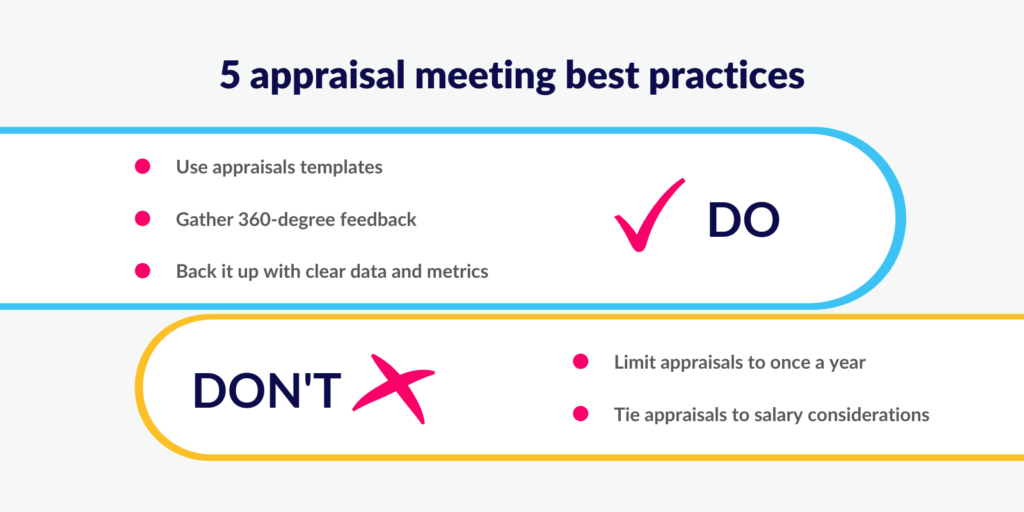
Use appraisals templates
A comprehensive appraisal can be a time-consuming process, particularly when organisations are conducting company-wide appraisals, for instance through end-of-year reviews. Using performance management software that allows users to set up and edit custom appraisal templates can save valuable time, as well as provide an opportunity to refine the process in the future.
Gather 360-degree feedback
As we’ve discussed in the limitations of appraisals, managers and HR leaders need to overcome a series of potential biases when assessing employee performance. 360-degree feedback is an effective tool to help mitigate the potential limitations of appraisals by gathering feedback from disinterested parties such as colleagues or clients.
Back up the appraisal with clear data and metrics
Appraisal feedback is more effective when it is backed up by clear data and metrics. Managers can use a vast pool of data collected through performance management software to help make the best decisions about employee performance and which direction to take moving forward. Present this data to employees so they can be confident the appraisal is based on facts not feelings.
Don’t limit appraisals to once a year
Traditionally, employee performance appraisals took place once a year as part of their annual performance review. Companies are increasingly moving towards more frequent appraisals to avoid the inherent biases in once-a-year reviews, such as the recency bias which fails to cover an employee’s achievement across a full year.
You can use performance management software to schedule and coordinate monthly and quarterly reviews to avoid common biases associated with yearly reviews, keeping the feedback focused on relevant and timely performance.
Don’t tie appraisals to salary considerations
Perhaps one of the biggest mistakes associated with appraisals is to directly link the appraisal to salary reviews. An article from Gallup exploring the pitfalls of performance appraisal systems observes:
“Annual performance reviews were — and in many cases still are — done around the time of salary adjustments. Presumably, the performance review explained an upcoming salary action. Employees viewed this connection with a high degree of suspicion. They believed that negative comments were not made with a genuine interest in helping them improve their performance; instead, they viewed the appraisals as a nit-picking exercise designed to justify a meager raise.”
When conducting appraisals, make sure all salary and other financial considerations are kept off the table for discussion on a separate occasion.
In Summary
Appraisals are an effective tool for gathering detailed insights into employee performance and help make the best decisions about future goals and career developments.
If you take on board the information in this guide, you’ll be able to avoid the common pitfalls associated with appraisals to deliver the best results, both for the employee and the company at large.






